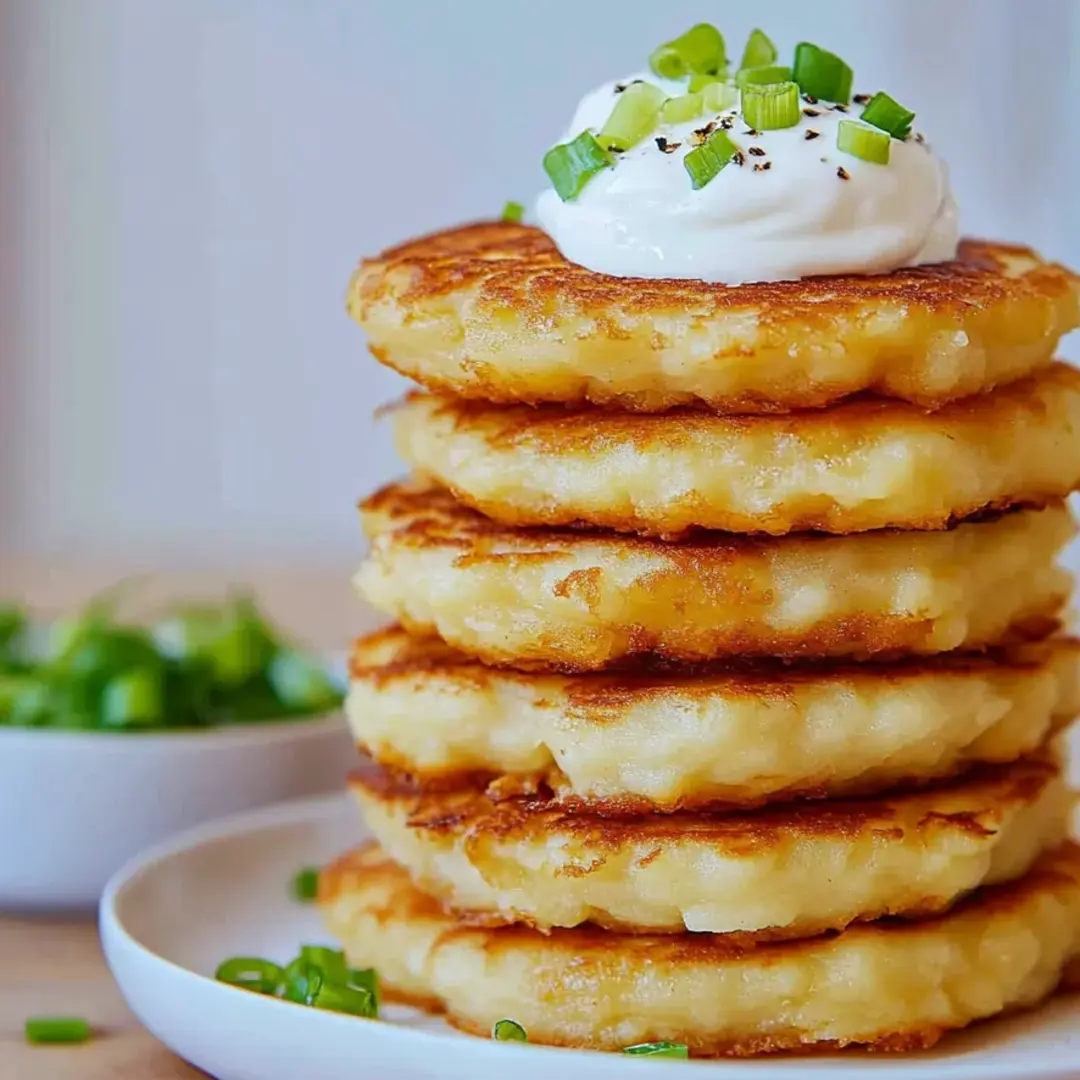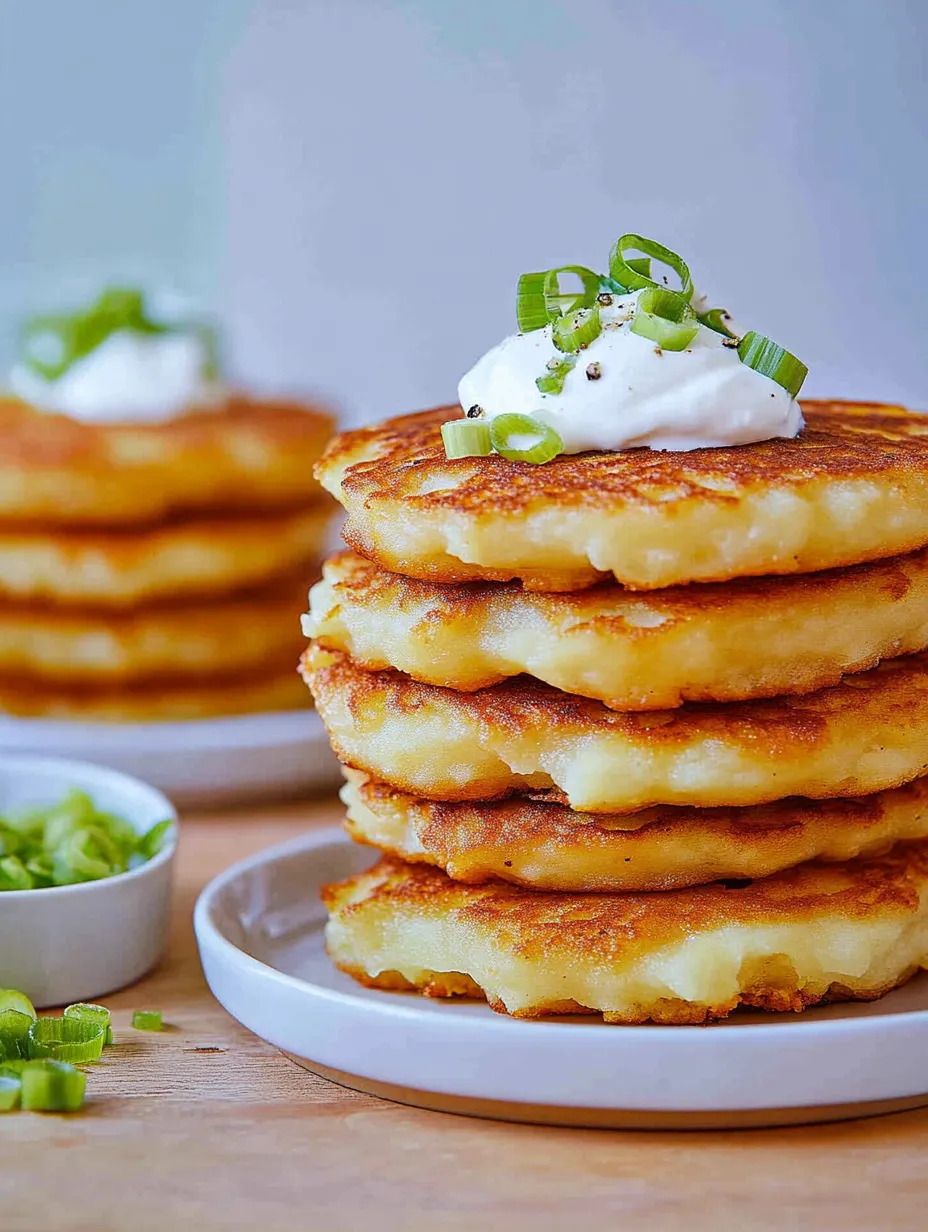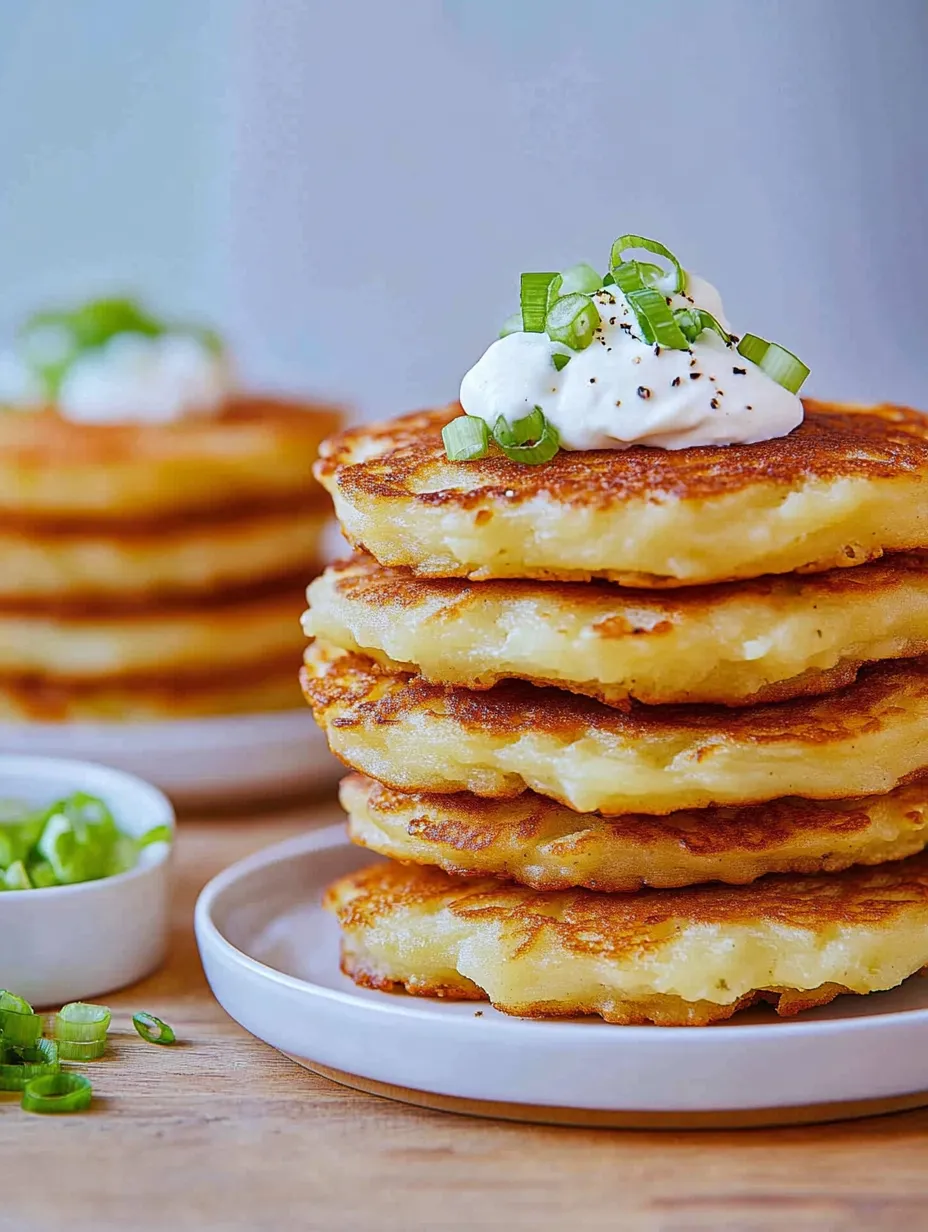 Pin it
Pin it
This leftover mashed potato pancake recipe transforms yesterday's side dish into today's crispy, golden star of the table. I discovered this method during a particularly busy holiday season when my refrigerator was overflowing with Thanksgiving leftovers, and it's now become our favorite day-after tradition.
This recipe has saved countless containers of forgotten mashed potatoes in my household. Even my children who claim to be "tired" of leftovers devour these pancakes without realizing they're eating yesterday's side dish.
Ingredients
- 3 cups chilled leftover mashed potatoes: Provides the perfect base; look for cold, firm potatoes for best results
- 2/3 cup shredded cheddar cheese: Adds richness and helps bind the pancakes; use sharp cheddar for more pronounced flavor
- 2 tablespoons chopped scallions: Green and white parts add a mild onion flavor that complements the potatoes beautifully
- 1 egg: Lightly beaten; works as the essential binder that holds everything together
- 1/2 cup plus 3 tablespoons all-purpose flour: Divided between mixing and dredging; creates structure and the perfect crispy exterior
- Vegetable oil: For pan-frying; choose a neutral oil with a high smoke point
- Sour cream: For serving; adds a cool, tangy contrast to the hot pancakes
Step-by-Step Instructions
- Mixing the Base:
- Combine your chilled mashed potatoes with cheese, scallions, egg, and 3 tablespoons flour in a large bowl. Mix thoroughly until all ingredients are fully incorporated. The mixture should hold together when pressed but still be somewhat soft. If it seems too wet, you can add flour a tablespoon at a time until it reaches the right consistency.
- Forming the Pancakes:
- Divide your potato mixture into 12 equal portions using your hands. Roll each portion into a ball first; this helps create even pancakes, then gently flatten into discs about 1/2-inch thick. Apply even pressure with your palms to create uniform thickness throughout each pancake for even cooking.
- Dredging Process:
- Place the remaining 1/2 cup flour in a shallow dish wide enough to fit a pancake. Carefully coat each pancake on all sides with a thin layer of flour. This step is crucial as it creates the golden exterior while protecting the soft interior. Gently shake off excess flour before frying.
- Perfect Frying Technique:
- Heat 3 to 4 tablespoons of oil in a large sauté pan over medium heat until shimmering but not smoking. The oil should generously coat the bottom of the pan. Working in batches of 3 to 4 pancakes depending on your pan size, carefully place the prepared pancakes in the hot oil, allowing at least an inch between each for proper browning.
- Creating the Golden Crust:
- Let the pancakes cook undisturbed for 2 minutes before checking the bottom. When they turn golden brown, carefully flip using a thin spatula and cook for another 1 to 2 minutes. Resist the urge to press down on the pancakes while cooking as this can make them dense. Add more oil between batches as needed to maintain the same frying environment.
- Finishing Touches:
- Transfer the finished pancakes to a paper towel-lined plate and immediately sprinkle with salt while still hot. This final seasoning adheres better to warm pancakes. Serve promptly with a dollop of cool sour cream and additional chopped scallions for garnish.
 Pin it
Pin it
My favorite part of this recipe is how the edges of the pancakes become irresistibly crispy while the centers remain creamy and soft. My grandmother used to make these with leftover holiday potatoes, and the sizzle of the batter hitting the hot oil still reminds me of gathering around her kitchen the morning after Thanksgiving.
Storage Solutions
These potato pancakes keep remarkably well. Once cooled completely, stack them with parchment paper between each layer in an airtight container in the refrigerator for up to 3 days. For longer storage, freeze them flat on a baking sheet until solid, then transfer to a freezer bag where they'll keep for up to 3 months. Reheat frozen pancakes in a 350°F oven for about 10 minutes until heated through and crispy again. The microwave works for quick reheating but sacrifices the crispy texture.
Creative Variations
The base recipe welcomes endless customization. Swap cheddar for other cheeses like Gruyère or pepper jack for different flavor profiles. Add crispy bacon bits, corn kernels, or finely diced bell peppers to the mixture for texture and color. For a breakfast version, serve with a fried egg on top and a dash of hot sauce. Herbaceous variations with chives, parsley, or dill create a fresher flavor perfect for spring meals. The possibilities are limited only by your imagination and refrigerator contents.
 Pin it
Pin it
Serving Suggestions
These versatile pancakes work across multiple meals. For breakfast, pair with eggs and bacon. At lunch, top with smoked salmon and a dollop of crème fraîche for an elegant open-faced sandwich. For dinner, serve alongside a simple green salad with vinaigrette for contrast. They make excellent appetizers when made smaller and topped with caviar or crabmeat mixture. During colder months, these pancakes complement hearty soups and stews as an alternative to bread.
Frequently Asked Questions
- → Can I use flavored mashed potatoes for these pancakes?
Yes, flavored mashed potatoes can work, but make adjustments to match the flavor profile of added ingredients like cheese and scallions.
- → What cheese is best for these potato pancakes?
Cheddar is a great choice for its sharp flavor and meltability, but other melty cheeses like Gouda or Monterey Jack can also work well.
- → How do I get the pancakes crispy?
Ensure the oil is hot before frying and avoid flipping too soon. Cook in batches to avoid overcrowding the pan.
- → What can I serve with these pancakes?
Sour cream and chopped scallions are classic toppings, but you can also serve them with applesauce or a dipping sauce of your choice.
- → Can I freeze leftover potato pancakes?
Yes, you can freeze the cooked pancakes. Reheat them in a skillet or oven to maintain their crispiness.
